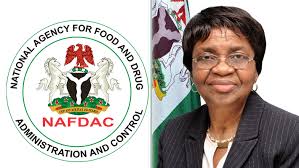
News
Prophet Jeremiah Fufeyin Miracle Claims Spark NAFDAC Probe

iexclusivenews – In a groundbreaking development, the National Agency for Food and Drug Administration and Control (NAFDAC) has launched an investigation into the activities of Prophet Jeremiah Fufeyin and his Christ Mercy Land Delivery Ministries.
The probe comes in response to allegations that the faith-based organization has been using NAFDAC’s name to market so-called miracle soap and water, claiming these products possess extraordinary healing powers.

The Critical Thinking Social Empowerment Foundation (CTSEF) has thrown its full support behind NAFDAC’s decision to investigate Prophet Jeremiah Fufeyin and his ministry.
This move has sent ripples through Nigeria’s faith healing community, raising questions about the authenticity of miraculous claims and the potential exploitation of believers.
NAFDAC’s Director General, Prof Mojisola Adeyeye, revealed that the agency received multiple petitions from concerned members of the public.

These complaints alleged that Prophet Jeremiah Fufeyin, based in Delta State, has been advertising and selling “miracle water” and “miracle soap” purported to cure a range of health issues, including infertility.
Perhaps most controversially, Fufeyin claimed that women using his soap would give birth to twins.
Table of Contents
The Controversial Claims of Prophet Jeremiah Fufeyin
This online news media learnt that at the heart of this investigation are the bold assertions made by Prophet Jeremiah Fufeyin.
During his services, he openly declared to his congregation that his miracle soap was NAFDAC registered, a claim that the agency firmly denies.
This false statement not only misleads his followers but also potentially undermines public trust in legitimate health products.
The list of products under scrutiny is extensive, including various “miracle waters” supposedly sourced from biblical locations such as the River Jordan and the Pool of Bethesda.
These items, bearing names like “Water of Life” and “A New Beginning Mount Carmel Miracle Water,” have been sent to NAFDAC for verification as part of the ongoing investigation.
Prophet Jeremiah Fufeyin Wider Impact
The implications of this investigation extend far beyond Prophet Jeremiah Fufeyin and his ministry.
It shines a spotlight on the broader issue of faith healing practices in Nigeria and raises important questions about the regulation of religious organizations that make health-related claims.
CTSEF’s director, Leo Igwe, points out that Fufeyin is not an isolated case. Many self-proclaimed prophets and faith healers across the country make similar miraculous claims, selling everything from holy oil to blessed handkerchiefs.
These practices, often targeting vulnerable individuals seeking solutions to health problems, have long been a concern for public health advocates.
The lack of scientific evidence supporting the efficacy of these “miracle” products is a critical issue.
Despite this, faith healers continue to promote and sell these items, potentially diverting people from seeking proper medical care.
The financial exploitation of believers, who may spend significant sums on these unproven remedies, is another serious concern.
Call for Expanded Investigation
In light of the Prophet Jeremiah Fufeyin case, CTSEF is urging NAFDAC to broaden its investigation to include all faith healers and their products.
This call for action reflects a growing sentiment that regulatory bodies need to take a more proactive stance in protecting public health from potentially harmful or fraudulent practices, regardless of their religious associations.
The foundation emphasizes that this is not an attack on religious freedom but rather a necessary step to ensure public safety and prevent exploitation.
By investigating and potentially prosecuting those who make false healing claims, NAFDAC could set a precedent that encourages greater accountability within the faith healing community.
Public Health Implications
The activities of Prophet Jeremiah Fufeyin and similar faith healers pose significant risks to public health.
By promoting unproven remedies, they may discourage individuals from seeking proper medical treatment for serious conditions.
This delay in obtaining legitimate healthcare can have severe consequences, particularly for those with progressive or life-threatening illnesses.
Moreover, the false sense of security provided by these “miracle” products could lead to the spread of communicable diseases if people believe they are protected or cured without proper medical intervention.
This scenario is particularly concerning in a country still grappling with various public health challenges.
The Role of Public Vigilance
As the investigation into Prophet Jeremiah Fufeyin unfolds, CTSEF and other advocacy groups are calling for increased public vigilance.
Citizens are encouraged to report any suspicious healing claims or products to NAFDAC, regardless of the religious standing of those making the claims.
This call to action represents a shift towards a more informed and critically thinking populace, one that can balance respect for religious beliefs with a healthy skepticism towards extraordinary claims lacking scientific backing.
What You Should Know
The NAFDAC investigation into Prophet Jeremiah Fufeyin’s miracle claims marks a significant moment in Nigeria’s ongoing struggle with unregulated faith healing practices.
As the probe continues, it may set important precedents for how religious claims intersect with public health regulations.
While respecting religious freedoms remains crucial, this case highlights the need for a balanced approach that protects vulnerable individuals from potential exploitation.
The outcome of this investigation could have far-reaching implications for faith healers across Nigeria, potentially ushering in a new era of accountability and transparency in religious healing practices.
As Nigeria continues to navigate the complex relationship between faith and healthcare, the Prophet Jeremiah Fufeyin case serves as a reminder of the critical role that regulatory bodies, advocacy groups, and an informed public play in safeguarding public health and well-being.



















